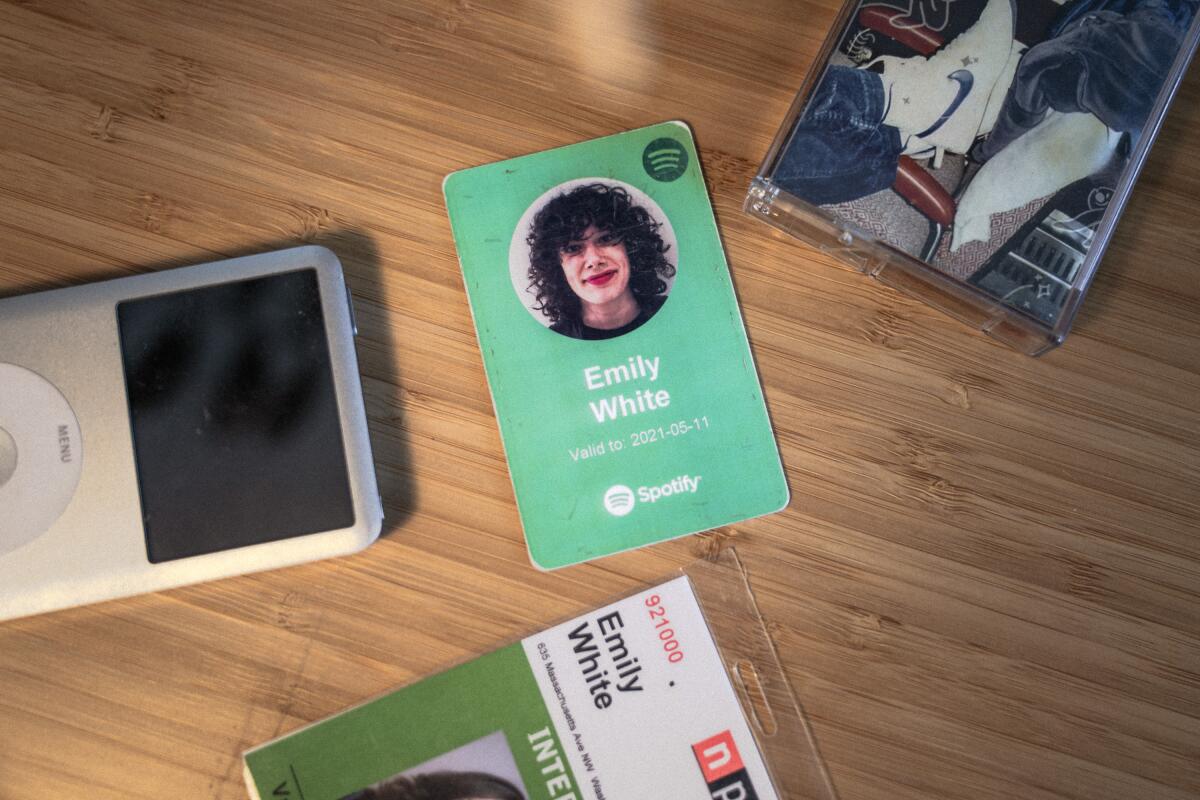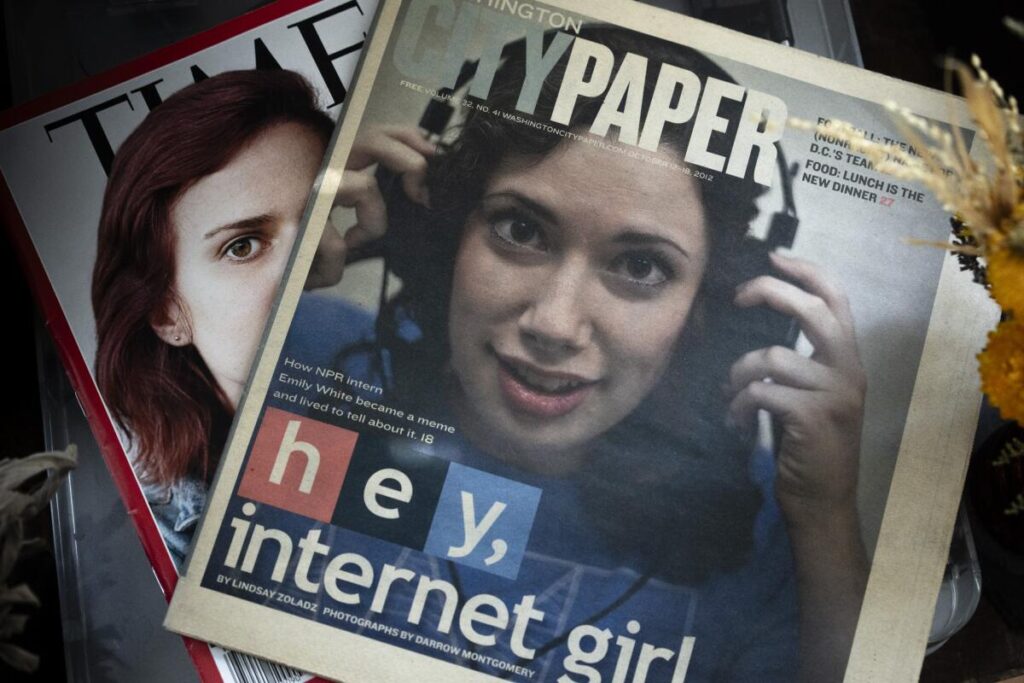It seems harmless now, but at the time, the article meant war. “I Never Owned Any Music to Begin With,” read the headline of the 2012 NPR blog post, written by Emily White, then a 20-year-old intern at the public radio institution.
White, an obsessive music fan who had cultivated a substantial digital library through less-than-legal means, had started working on the essay before her internship started, and arrived at the NPR offices in Washington, D.C., with a draft in hand. Floating along in the unsteady musical landscape following the Napster era, White felt compelled to share the vision she saw in front of her: The future was streaming, and it was cheap. In other words, the writing was on the wall, and the CDs were piling up in the trash. For the vast majority of listeners, the days of purchasing individual albums were over, like it or not.
“As monumental a role as musicians and albums have played in my life,” White wrote, “I’ve never invested money in them aside from concert tickets and T-shirts.” She later added, “I can’t support them with concert tickets and T-shirts alone. But I honestly don’t think my peers and I will ever pay for albums. I do think we will pay for convenience.”
White proudly took a screenshot of her article featured on the NPR homepage, and figured that would be about it. But the internet wasn’t done with her. First the comments on the article page started popping in, one by one. Soon there was a firestorm of outside responses from aggrieved music lovers and makers — including an impassioned plea from David Lowery of Camper Van Beethoven — about the morals of supporting the arts. Within three days the saga made its way to the New York Times: “NPR Intern Gets an Earful After Blogging About 11,000 Songs, Almost None Paid For,” the headline read.
“The original blog post, and what came from it, was very beneficial to my life in lots of ways,” said White, 33, speaking on a video call from her home in Brooklyn. “It was also a big wound for a long time.”
In the way that the internet tends to go, briefly becoming the main character was a mostly brutal exercise. Vice ran “An Open Letter to NPR Intern Emily White” accompanied by an image of the spoiled Veruca Salt character from “Willy Wonka.” Yo La Tengo, a band lovingly name-checked by White in her essay, cheekily tweeted at her: “we just stole your bike.” Lowery, in his essay, suggested that White was contributing to the increasing financial difficulty of being a musician, which, he said, had been a factor in two of his musician friends — Mark Linkous of Sparklehorse and Vic Chesnutt — ending their own lives. “It is not up to governments or corporations to make us choose to behave ethically,” he wrote. “We have to do that ourselves.” (Lowery turned down an interview request for this article.)
At 21 years old, Emily White sparked a wave of controversy and passionate responses with an essay for NPR on forgoing buying music and going all in on Internet streaming.
(Oliver Farshi)
A few months later, in a profile for Washington City Paper, Lindsay Zoladz sized up the circus and dubbed White “the most controversial D.C. intern since Monica Lewinsky.” She wasn’t kidding. Looking back on White’s original 500-word essay, trying to pinpoint the source of the internet’s ire, you might think you missed a line in which she insisted that all musicians be drawn and quartered.
“Those few years were just so fraught,” Zoladz, now a pop music critic at the New York Times, said in a phone interview. She brought up a 2013 Time magazine cover story about millennials titled “The Me Me Me Generation”; at that point, reasoned Zoladz, the inclination was for the conversation to be about millennials’ behavior without examining the root causes behind it. “We weren’t talking about how it’s going to be really difficult for us to own homes, let alone CD towers full of music.”
After college, White worked for a few years at Billboard, where she wrote a follow-up “future of music”–style essay. (“I feel like we can all agree on one thing: We want good artists to continue making good music,” she wrote. “And to do that, those artists must be able to support themselves.”) But her trail went cold after that. Drawn to this story as a time capsule demonstrating just how much the conversation around streaming has — and hasn’t — changed in the last decade, I decided to look her up. And there it was on her LinkedIn: Emily White, physical media’s angel of death, had started working at Spotify in 2016.
“Definitely not,” White said, when I asked if the experience of being chastised for her article drew her to work at a place like Spotify — if it made her more dogmatic about the value of streaming. “Actually the opposite. It made me much more inquisitive or skeptical.” Being a music industry lightning rod, she said, had sent her down a particular path: “We have to figure out the right model.”
According to White, her NPR fame didn’t even play a role in getting the Spotify gig. She was recruited by a Spotify employee who saw a Medium post White had written in 2015 about podcasts. Before long, White was being sold on a product management gig to help develop the nascent Spotify for Artists program, which was designed to offer more information for musicians on the platform — how their music is being played and where the streams are coming from, for example — and also integrating merch and ticket sales within the app. “I was like, ‘OK, I want to be part of that,’” White remembered.
Some of the culture clash that White has come to represent is present on the video call with her. Below a bob of curly, black hair, she’s wearing an Angel Olsen tour shirt, and in the background is her “shelf of music formats”: tapes, records and a decorative iPod Nano, if you can believe it. She’s easy to talk to but simultaneously careful, calculating. It seems she doesn’t want her words to be misconstrued, lest she end up back on the internet’s firing line. She also isn’t allowed to speak totally freely.
I first reached out to White about doing an interview a few years ago, and she said she’d be glad to — but subsequently informed me that Spotify wouldn’t allow it. Then, this past December, Spotify laid off roughly 1,500 workers — 17% of its workforce — and White was among them. This meant she could no longer be prevented from doing an interview, but, as she explained, there were certain restrictions in place. Her separation agreement included nondisclosure and nondisparagement clauses. Candid discussion of Spotify would simply not be feasible.

Objects from Emily White’s past including her Spotify employee ID card, NPR intern ID card, Apple iPod and a cassette tape.
(Oliver Farshi)
“The fact that Emily and I are constrained about what we can say is lame,” said Glenn McDonald, Spotify’s former “Data Alchemist,” who was caught in the same round of layoffs as White and has similar contractual restrictions. Despite them, however, McDonald has a book about streaming out this month, “You Have Not Yet Heard Your Favourite Song.”
Though McDonald said he is “fairly pro the [Spotify] model,” and described his book as being a discussion of streaming that’s “half fear and half new joys,” Spotify “wasn’t entirely thrilled about it, to put it mildly,” he said. But he pushed forward anyway.
“[The secrecy] forces everybody to guess,” McDonald said on a video call from his new job at an AI startup, Imbue. “And if you have to guess, you’re always going to guess whatever aligns with your prejudices or your assumptions or your fears. That’s how people are.” He said the muzzle on employees “doesn’t help us make progress as a society.” (When reached for this story, Spotify had no comment in response to McDonald.)
White may not be able to tell me about Spotify’s financial struggles that led to the layoffs, or what kind of car CEO Daniel Ek drives. But she can frankly share her thoughts on music streaming at large. This was fine with me, because it was the big picture, after all, that she was sniffing out when she first made waves in 2012, as Spotify was just getting off the ground. What she hoped for in her original essay was “one massive Spotify-like catalog of music that will sync to my phone and various home entertainment devices,” albeit “hopefully with more money going back to the artist than the present model.” Well, she got the first part, anyway.
“In my early 20s,” White told me, “I was more like, ‘Well, streaming will become like a utility. It will become like your water bill once everyone on Earth is paying for it and it scales.’” Streaming, as White found out, works fantastically for rights holders with large amounts of catalog and artists with tremendous growth — but certainly not everyone. “I didn’t realize at the time,” she admitted, “that it was like putting a high-speed train on a rusted train track, and that the money doesn’t flow, and the systems are very broken.”
One curious statistic that puts the issue into focus is that, adjusted for inflation, recorded music revenue has been rebounding for the last decade, and in total resembles the industry in the 1970s. In some sense, there should be plenty of money to go around. But it’s not being divvied up in a way that’s working for the middle class of artists — a middle class that’s effectively been relegated to a lower class, as artists desperately explain that they can no longer make a living.
How to better split the money pie is one vital, dangerous conversation, to be sure. But White, in her corner of the world, is compelled by a different approach: “I get more excited and I’m most interested in: How do you grow the pie?”
Streaming, White believes, underserves artists because “it doesn’t reward depth of fandom in any way.” A $10.99-a-month Spotify membership, for instance, is hardly the limit on what superfans are willing to spend on the music they care about; it’s like offering fast food to foodies and assuming they’ll be satisfied. White’s thinking is that there’s an unfulfilled market for those looking for something richer, something more tangible — a belief that would help explain why 50% of people who purchased vinyl in 2022 didn’t even own a record player, according to a survey by Luminate.
All this has made White bullish on novel methods for artists to engage with listeners outside of places like Spotify or Apple Music. LPs, shirts and concert tickets are a given, of course. (White still loves Yo La Tengo, for what it’s worth, and sees them whenever she can; no hard feelings.) But this also includes newer concepts currently playing themselves out, such as Substack, Patreon and Vault, which are subscription services that can offer a more intimate look inside an artist’s life and work. (White has been giving James Blake’s Vault a test drive lately.)

Emily White joined Spotify after a recruiter saw her Medium essay on podcasting.
(Oliver Farshi)
To some, this might sound like asking consumers to recycle in order to offset the environmental damage done by corporations. Like shaming consumers into supporting the arts — similar to the way White was shamed in 2012. But in its ideal form, White explained, this nonstreaming economy should embody a “value exchange” between artists and fans.
“It’s normal for individuals to choose things that are convenient, choose things that are inexpensive,” she said. “It’s also normal and reasonable for consumers to take into consideration things like fair working practices, things that are better for the environment. … It’s why people who donate to NPR get their mugs and tote bags. It’s a donation, but you’re also getting a memento or something that signifies that you’re the kind of person who donates to NPR.”
Now that White is a free agent again, she’s been taking meetings, hoping to help build up the landscape she’s preaching about. “Ultimately,” she said, “I am an optimist. I believe there are many solutions. Streaming is not the end-all, be-all.”
One detail I was surprised to learn is that, at Spotify, most people didn’t know of White’s NPR origin story. Glenn McDonald, for instance, knew of the NPR article and knew White, but “didn’t put the two together until much later.” White explained that the angry hordes had done some damage, and she simply didn’t want to be defined by that experience.
“It took me many, many years,” she said, “to regain confidence in my ideas and my perspectives, because I had this fear that maybe that was stupid, or that was wrong, or I shouldn’t have said that kind of thing.” She sees the story a little differently now. “Now I’m at the point where I’m like, if I was right 12 years ago, I’m probably right now.”

